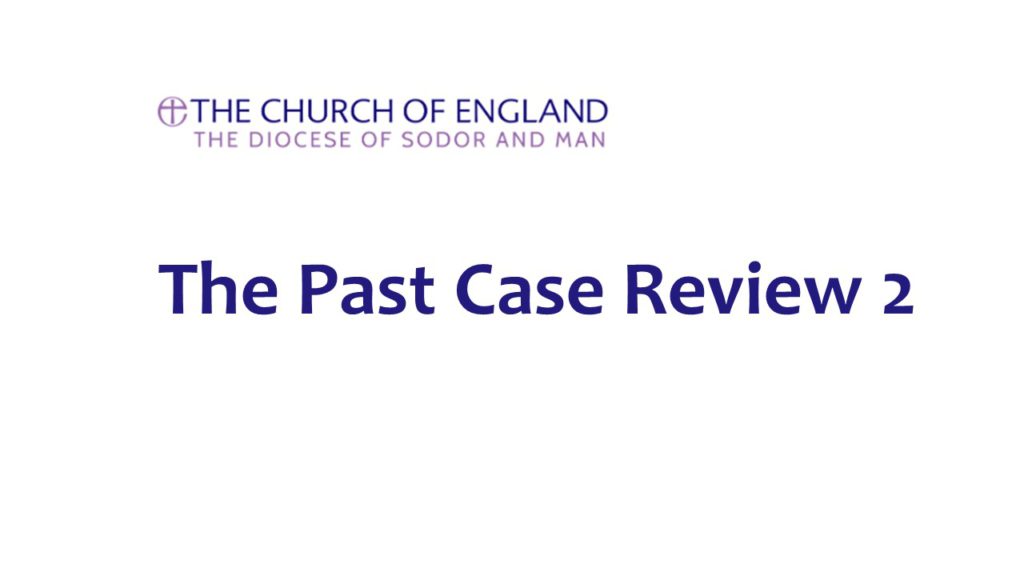The Past Cases Review 2 (PCR2) is a national independent review of the handling of safeguarding case in the Church of England over many years. The purpose of the review is to ensure that all known cases of concern have been dealt with appropriately. The review has been carried out across all 42 dioceses as well as Lambeth and Bishopthorpe Palaces and the National Safeguarding Team (NST) each producing their own local findings and recommendations.
Bishop Peter commenting on the participation of the Diocese of Sodor and Man in the review said,
‘The Diocese of Sodor and Man was pleased to participate in PCR 2. Our work has been received, acknowledged and endorsed, and we are completing the implementation of the Recommendations of the Independent Reviewer. The commitment of this diocese to the highest standards of Safeguarding remains absolute, and we are grateful to all who have facilitated the significant step on this journey through their work on PCR 2. I express my own thanks particularly to the Independent Reviewer, and also to our Ecumenical Safeguarding Adviser and Co-ordinator and to colleagues in the Diocesan Safeguarding Team. We have learnt good lessons and will ensure that they are put into practice as part of our standard procedures.
PCR2 findings for the Diocese of Sodor and Man
It was encouraging for the Diocese that the PCR 2 reviewer recognised that the innovative cross denominational arrangements which operate on the Island were working highly effectively; The reviewer commented:
‘In September 2018 a full time ecumenical Diocesan Safeguarding Advisor (DSA) was appointed to provide professional advice to the four denominations involved in the arrangement. The shared advisor enables compliance with policy and procedures. This capacity increases the awareness of safeguarding across the Church’s workforce, with the aim of making the church a safe environment.’
The reviewer went on to say:
‘The current structural arrangements in place in the Diocese of Sodor and Man can be identified as a best practice solution to the circumstances. They demonstrate a commitment to ensuring that all those working and volunteering in the church fulfill their duties of ‘having due regard to their safeguarding responsibilities’. It is in its infancy…(with) improvement that is tangible.’
‘The ecumenical DSA also acts as a conduit for promoting best practice in the faith sector more widely. Having a single point of contact for the statutory services has proved to be a core element in this enhanced communication and partnership approaches to risk management. The professional background of the DSA has provided an understanding of the priorities of the sector which has also facilitated this relationship.’
‘The DSA is fully informed of the procedures of the Safeguarding Board and how to refer and seek advice on any matter where required and has strong professional links making it effective.’
The reviewer commented finally that:
‘It should be noted the Isle of Man does not have the same comprehensive legislative framework that UK jurisdictions have and much best practice currently is based on Policy not statutory duty.’
Recommendations
There were five recommendations which related to the Diocese, all of which have been actioned and implemented.
- It is recommended that all physical files are cross referenced against the DSA database; and then a more robust process is agreed to ensure triangulation between the data base and blue file. This should be completed in conjunction with direction from the NST and national HR advice.
- It is recommended that compliance with GDPR and retention procedures is undertaken.
- It is recommended that a process for integrating information and files is established.
- It is recommended that the pathway being applied by the DSA is agreed locally as the process for case management . This will operationalise:
-
- the procedural requirements, setting out the stages of inquiry and investigation
- identifies the responsible person to undertake these actions
- establishes an agreed proforma for recording succinctly the outcomes and reasons for action taken or not taken,
- and that a summary proforma is agreed to always be on the blue personal file.
- It is recommended that the risk assessment tools applied by the DSA are locally agreed for use where the Diocese undertake their own inquiries in the absence of any other statutory involvement (police/social care)
A link to the national report can be found here: Weblink
A link to the Safeguarding page for the Diocese of Sodor and Man can be found here: Weblink


